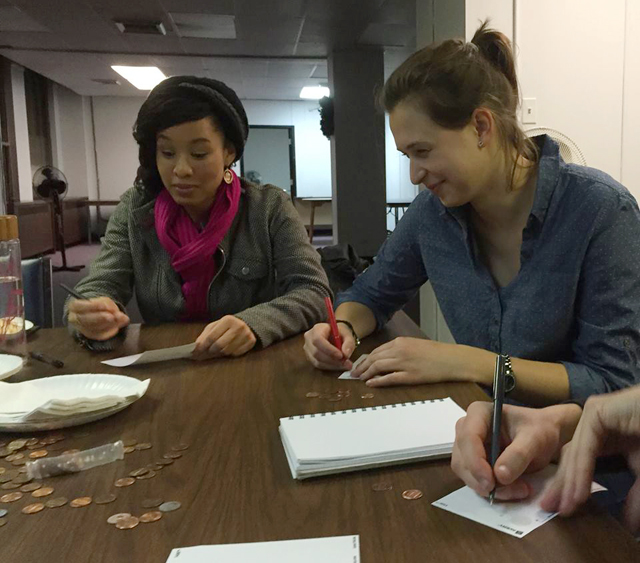
Creativity builds community in Detroit
Image courtesy of the Detroit League of Creative Interventionists.
Grab a penny; change your world.
Not an idea you hear everyday. But so went a recent call to action in Detroit issued by Rebecca “Bucky” Willis and Julia Schlau. The pair of 20-somethings are co-founders of the Detroit League of Creative Interventionists, a local affiliate of a global group that invites strangers to make community connections by engaging in public art-based events and conversations.
“You really have to have a sense of adventure and a willingness to take any curve ball thrown at you,’’ says 25-year-old Willis.
The league started in 2014 as a point of curiosity in the mind of San Francisco-based artist Hunter Franks. He wanted to discover whether creativity could become a catalyst for deeper community interaction. Support from Knight Foundation led to a tour of four Knight communities, including Detroit, for three weeks each, and the subsequent launch of chapters around the world. Each month, Franks sends out a theme, and local leaders decide how to respond in their community.
In Detroit, the January theme of “Change” led to the penny prompt. Participants were asked to bring pocket change and an open mind to a two-hour meeting. Schlau and Willis provided everything else: free snacks, free stickers and a simple instruction to decorate the pennies with symbols of either a personal change or a change they’d like to help spark in Detroit.
“It’s been our most popular intervention so far,’’ says Schlau, 23, a graduate student at the University of Detroit Mercy School of Architecture, where she met Willis, a graduate of the school.
About a dozen or so University of Detroit Mercy students and residents from Lindale Gardens, a Northeast Detroit neighborhood where public art is becoming an antidote to blight, attended the meeting. The night’s creations included pennies transformed into images of litter being tossed into a trash can, trees, pleas for peace, God and smiley faces.
“The other big part,’’ says Schlau, “was having everyone agree to carry their penny as a reminder to take a step and then pass the penny along to stranger or a friend with a suggestion that they join in the change and consider learning more about the league.’’
Another of the Detroit League’s interventions involved creating public “hand posters.” Random strangers and league members were asked to each place a hand on a poster, without removing it until they’d learned enough about one another to break “the barrier of strange.’’
Schlau and Willis say they are encouraged by what they’ve witnessed. “I don’t think people from my neighborhood would ever have met and worked with architect students had it not been for an opportunity like this,’’ says Willis, 25, a native of Lindale Gardens who founded her own community design organization, Bleeding Heart Design. “The success of the league is the commitment of diverse people who come willing to give it a go, to see how far an idea can reach in fostering a connection.’’ It’s as simple as that, Willis says.
Some of the group’s interventions have been even simpler, such as the decision to design and distribute 1,000 stickers proclaiming “someone else is HAPPY with less than you have.’’ The idea came from the league’s youngest participant, a 14-year-old. Willis and Schlau jumped at the chance to spread the teen’s idea and even found funding from the Mercy School of Architecture, which has become a league booster, they say.
“There is a template for how this usually goes in other cities,’’ Willis says. “But instead of getting stuck in planning, we like ideas that we can plan quickly and implement quickly. Detroit has so many things going on right now; people have a lot of ways to spend their time.’’
Time, it turns out, is the Detroit League’s lone requirement. “When you hear the name it seems there’d probably be this official membership process,’’ Willis explains. “But we’re trying to keep it simple. If you show up, you’re part of the league.’’
Schlau says the simplicity comes with a major privilege. “Anyone can lead,’’ she says. “That’s the hope, at least, that more people will come have some fun and pick up the responsibility of sharing an idea, and following through. It’s a real low-commitment way to engage the city.’’
To learn more about the Detroit League of Creative Interventionists, visit their website or Facebook page.
Nichole M. Christian is a Detroit-based writer and co-author of “Canvas Detroit” (Wayne State University Press, 2014), a book profiling nearly 40 of the city’s public artists.
Recent Content
-
Artsarticle ·
-
Artsarticle ·
-
Artsarticle ·
